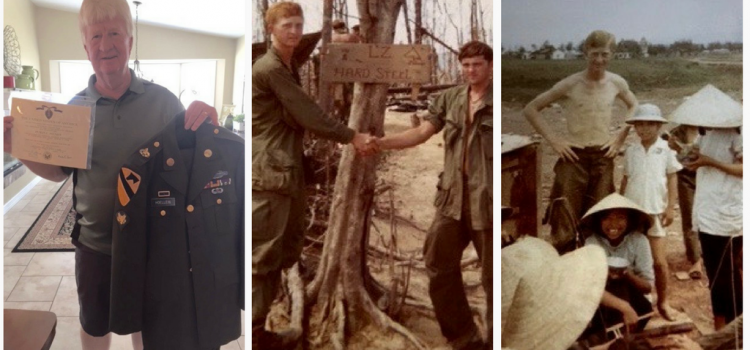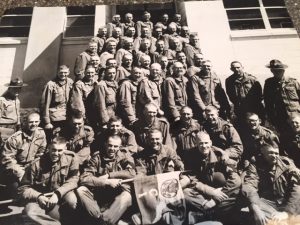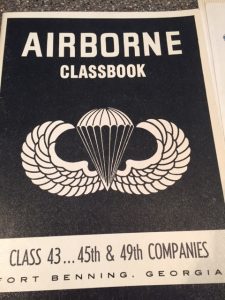
Steve Hoellein lived a lifetime in the nearly five months he spent in Vietnam in the late 1960s. He saw things, felt things and did things that are still hard to talk about today – some things still evoke tears as he talks about them. Still the question remains for him: Vietnam…what are we doing here? His Vietnam Veteran story inspired me.
A powerful Vietnam Veteran story, told in humility
When I reached out to interview Hoellein, he was reluctant, believing his Vietnam Veteran story was not all that special. I beg to differ.
He was a self-proclaimed “little shrimp” when he was drafted to go to Vietnam in 1968.  Once there, he tried to figure out where he fit in. He quickly found out one thing – drugs would not be the course for him. “There was a drug problem over there. That was a shock to me,” Hoellein said. But he quickly saw that many made the drug choice and it was damaging to the cause. But, what was the cause?
Once there, he tried to figure out where he fit in. He quickly found out one thing – drugs would not be the course for him. “There was a drug problem over there. That was a shock to me,” Hoellein said. But he quickly saw that many made the drug choice and it was damaging to the cause. But, what was the cause?
Read Related: Every Uneventful Day is a Gift – Honoring Veterans and their sacrifice
He spent more than half of his time in North Vietnam but when he learned he would be dispatched to an area just out of Saigon he was nervous. He knew it was pure jungle – sometimes 40 to 50 feet of it over his head. “I knew there would be guys hiding out everywhere,” he said. He also knew he didn’t really know the enemy. In North Vietnam he felt he was on level playing field battling the North Vietnamese, but near Saigon it was the VietKong. “They were crazy, unpredictable,” Hoellein said, shaking his head at the memory.
 Before one of their impending raids they waited all day, nearly 8 hours to take off. Once they did, they got about 10 feet in the air and the pilot realized the helicopter was on fire. He landed quickly, the men tumbled out – grabbing their weapons, careful not to deploy them and ran to the next helicopter about to take off. As Hoellein got on, his surroundings were sobering. He could tell the helicopter had been shot at with bullet holes and then there was blood – blood everywhere in the copter. His thought of “What are we doing here, quickly became, ‘What in the hell are we doing here?'” He was nervous, he was amped up, and he had to move forward.
Before one of their impending raids they waited all day, nearly 8 hours to take off. Once they did, they got about 10 feet in the air and the pilot realized the helicopter was on fire. He landed quickly, the men tumbled out – grabbing their weapons, careful not to deploy them and ran to the next helicopter about to take off. As Hoellein got on, his surroundings were sobering. He could tell the helicopter had been shot at with bullet holes and then there was blood – blood everywhere in the copter. His thought of “What are we doing here, quickly became, ‘What in the hell are we doing here?'” He was nervous, he was amped up, and he had to move forward.
When they got to their spot to deploy they could see artillery fire everywhere. Shots were going off all around and casualties started piling up. It didn’t take long for Hoellein to realize their radio guy was down. In that split second he knew he had to get that radio. The area had grown quiet and he decided to make a run for it. Right before he got to the radio, he was thrust down with an incredible force.

He’d been shot! No bullet had penetrated his protective gear yet but the force of the shot caused him to roll. Then another shot came quickly, hitting him in the arm and he felt the shrapnel lodge into his arm and chest. His arm went completely numb. At that, he grabbed the radio just as he heard a flurry of shots from his own company directed at the sniper that had shot him. They shot until the sniper fell out of the tree. Hoillein ran back to his post.
When he got back, his friend immediately tied his arm. “I couldn’t look at. I didn’t want to go into shock, you see. I just couldn’t look,” he said motioning to where the shrapnel hit in his right arm. They used the radio to call back and found that no one could get them out any time soon, so they walked. They walked through chest-high water, all the while Hoillein’s arm was limp and numb by his side.
Related: What is your patriotism story?
When they finally got back, the medic was ecstatic to see how well his arm had held up, but he had to be treated. The shrapnel had lodged in his arm, hitting a nerve. Later the nerve that would repair and the feeling would come back in six months. H e hoped his tour would last that much longer, but he was told he was a liability with the injury, so he finished out his service in the states.
In the end, Hoellein earned three awards he is proud of to this day: Airborne ranger, Combat Infantryman Badge and the Purple Heart. On the day I interviewed him, he hadn’t really touched his Army uniform in the last 50 years since then and still shakes his head when he thinks of the war – why it was fought and how it was lost. “There are so many things, so many questions I still ask myself when I think of all the stories. What were we doing there?'”
I will always remember this Vietnam Veteran Story
As a post-script, I wrote this a while ago, but it is one that has hung with me. I often think about how it was his daughter who told us about him but Hoellein himself was reluctant to tell his veteran story. He didn’t think he did anything special. Like may other Vietnam Veterans, he doesn’t talk about his service and he never sought recognition. But when he brought out his uniform and showed his family it was an emotional moment, and it made me want to honor him all the more. This year on Veterans Day, I will be thinking about him and everyone else who served in this conflict without ever being thanked.
Read related: 6 ideas for Celebrating Veteran’s Day
Do you know a Veteran whose story deserves to be told? Interview him or her while you can. One of the best ways to honor a veteran is to listen and to care. Read about the Library of Congress Veteran History Project

Rachel J. Trotter is a senior writer/editor at Evalogue.Life – Tell Your Story. She tells people’s stories and shares hers to encourage others. She loves family storytelling. A graduate of Weber State University, she has had articles featured on LDSLiving.com and Mormon.org. She and her husband, Mat, have six children and live on the East Bench in Ogden, Utah.
Do a family history interview

Sign up and we will email you a free, printable download of our mini-course to conduct a great oral history interview. You will be done in a week or less.


